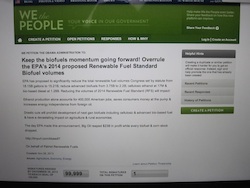Darrell Rakestraw joined the military in 1982. A local boy who grew up on a centennial farm near Annawan, Illinois, he served his country in the army for nearly 20 years before retiring and moving back home with his family.

Veteran Darrell Rakestraw signs the Support the RFS We the People petition that he created on behalf of Patriot Renewable Fuels. He encourages everyone who believes in energy security to help fight the good fight and sign the petition.
During the time he was stationed in Germany, he came home on leave and heard everyone talking about how America was fighting for oil.
“As a solder I found that hard to believe that we were fighting for oil,” said Rakestraw. “I thought we were fighting for a cause – for an injustice being done to Kuwait at that time.”
After retiring in 2002, he continued to support American troops until he retired and began his second career: working for the local ethanol plant Patriot Renewable Fuels. Rakestraw said heralding from a farm, agriculture and ethanol were very tied together.
Then on November 15, 2013 his view of why America is at war changed. This is the day the Environmental Protection Agency (EPA) announced its 2014 proposed renewable fuel volumes for the Renewable Fuel Standard (RFS). Rakestraw said this is the moment he realized that America is in fact fighting for oil. “This proposal is now telling me it is the truth. So is that what we’ve been fighting for all this time?”
“I look at it like a slap in the face for me as a veteran,” continued Rakestraw. “To every veteran out there. For all the men and women who are still serving. And I really think that Big Oil is dancing on the graves of all the soldiers who sacrificed their lives. It’s a wrong decision to make. We have to get less dependent on foreign oil. This really woke me up.”
He knows that other veterans feel the same way as he and is encouraging people to fight for the RFS. On behalf of Patriot Renewable Fuels, Rakestraw created a WhiteHouse.gov “We the People” petition in support of the RFS, and encourages everyone who believes in this fight to sign the petition.
“We’re doing this for our soldiers. We’re doing this for our farmers. We’re doing this for our rural economies. We’re doing this for ethanol supporters and ethanol producers,” said Rakestraw who stresses that if the proposed 2014 RFS rule passes, it will a huge, negative effect on both the biofuels industry as well as the ag industry.
When asked what it was that he really wants Americans to know right now Rakestraw answered, “They need to realize we will continue to commit our mothers and fathers and our sons and daughters to wars in foreign lands. They may claim its in the name of humanity, but a lot of time it’s in the name of Big OIl.”
“And we’ve got to stop that.”
Check out the Patriot Renewable Fuels Photo Album.











